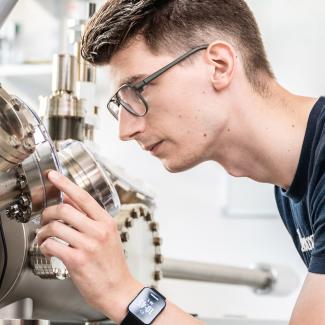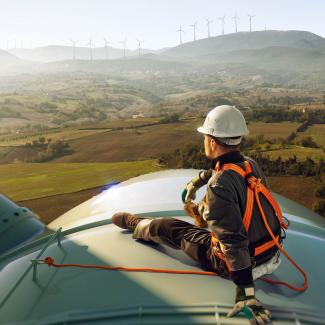Environmental technology
As an environmental engineer, you will ensure environmental compatibility, social acceptance and international competitiveness in the design, construction and operation of technical facilities. The degree programme is therefore based on the so-called "three pillars of sustainability", namely ecology, economy and social aspects, whereby your studies will focus on projects to protect the environment, the sustainable use of resources, the recycling of residual materials and the closing of material cycles. As an environmental engineer, you should therefore have a very broad basic knowledge, which we are very happy to impart to you in our Bachelor's degree programme in Environmental Engineering.
The first four semesters of the 7-semester Bachelor's degree programme in Environmental Engineering are designed in such a way that you can quickly familiarise yourself with new tasks with varying requirements based on a very comprehensive basic education (mathematical, scientific and engineering). You will not only familiarise yourself with these scientific and engineering fundamentals, but also learn to understand them. This small but subtle difference is crucial for you to be able to transfer and apply your knowledge to new challenges later on and to assess your ideas and the ideas of others in terms of their usefulness and feasibility.
From the fourth semester onwards, you will increasingly focus on the fundamentals of environmental engineering. This means that from the fourth semester onwards, the Bachelor's degree programme in Environmental Engineering differs significantly from the other degree programmes offered at our faculty. In Environmental Engineering, you will then study the following modules (courses), which you will not get in the other Bachelor's degree programmes:
"Introduction to the Principles of Biology and Ecology"
"Fundamentals of Biochemistry and Microbiology"
"Environmental Process Engineering"
The catalogue of compulsory elective modules is also tailored to environmental engineering with topics from recycling, waste management and energy management.
Of course, you can develop according to your interests by choosing your coursework topic, the topic of your Bachelor's thesis and by choosing a completely free elective module and by choosing a few modules from a module catalogue.
Please note that there is hardly any time for in-depth or specific environmental engineering content in a 7-semester Bachelor's degree programme. The Bachelor's programme therefore hardly goes beyond the broad basics of environmental engineering. From the summer semester of 2024, we will therefore be offering an advanced 3-semester Master's degree programme in Environmental Engineering, in which you can acquire comprehensive and more specialised knowledge (with options to choose from according to your interests) after completing your Bachelor's degree.
What else needs to be said:
The Bachelor's degree programme in Environmental Engineering is integrated into the Engineering Bachelor's degree programme at our university. You will receive a Bachelor's certificate for Environmental Engineering, not for Engineering. This combines several degree programmes, which are very similar in the first three to four semesters, into one Bachelor's degree programme. If you would like to find out more, please give us a call.
When we developed the Bachelor's degree programme in Engineering together with dedicated students at our faculty in 2020, the following was very important to us in terms of studyability:
- relatively few exams per examination period: you don't have to rush from exam to exam! You have the time and opportunity to really get to grips with the material and learn it for your long-term memory.
- Early contact (from the second semester) with modules with engineering applications and reference to current research work: This keeps your motivation for the engineering degree programme at a high level even during the otherwise long "dry spell" of basic science and engineering training (first four semesters).
- Individual options by choosing compulsory elective modules from a predefined module catalogue and by choosing free elective modules: You can develop flexibly according to your engineering interests and have the opportunity to think outside the box.
- You will gain practical and research experience in the basic internship, during two specialist excursions, a student research project, a 14-week specialist internship and a Bachelor's thesis.
- An education in the specialised language of English and introductory business administration will also provide you with the basis for success in an international environment.
We, the study committee, are convinced that with the Bachelor's degree programme, we are providing a flexible yet rigorous undergraduate degree programme that will prepare you excellently for future job profiles in further engineering degree programmes, in industry, business and science, taking your interests into account.
We will be happy to support you. If you have any questions about the programme, please give us a call.
- Faculty
-
Faculty of Mechanical, Process and Energy Engineering (Faculty 4)
- Degree
-
Bachelor of Science (B. Sc.)
- Standard period of study
-
7 Semester
- Part-time possible
-
No
- Start of studies
-
Winter semesterSummer semester
- Admission requirement
-
Baccalaureate or subject-specific higher education entrance qualification or an entrance qualification recognised as equivalent
Language requirement
- Application: with at least B1 level German
- Admission to the degree program: with C1 level German (e.g. DSH-2)
- language courses and DSH exam at TUBAF
- Course language
-
German
Environmental engineers find professional fields wherever engineering tasks have to be solved in close interaction with the respective economic and ecological environment. This often involves working in or leading interdisciplinary groups. Typical professional fields are:
Research and development
Research into the interactions between technical, ecological, economic and social influences and effects and their targeted utilisation for the sustainable development of the economy and society. Work in interdisciplinary groups with people from the fields of biology, climatology and other natural sciences as well as economics, law and social sciences.
Manufacturing companies
Planning and development of new products, production processes and production facilities in connection with their embedding in ecological, economic and legal contexts. In addition to leading interdisciplinary teams, dialogue with authorities and associations is an essential task.
Municipal and regional development offices
Planning and evaluation of supply and disposal facilities for industrial and commercial company sites, residential areas and municipal facilities in connection with ecological, economic and social interdependencies.
Approval and monitoring bodies
Ecological evaluation, auditing and certification of companies and products. The authorisation and monitoring bodies act as interfaces between business, society and public administration.
Why study Environmental Engineering at TUBAF?
- Because the needs of the students were strongly taken into account when creating the degree programme (manageable number of examinations, stringent study options, elective options, application and research relevance at an early stage of your studies)
- Because you value short distances and personal contact with lecturers
- Because you would like to benefit from the lecturers' international contacts and receive support in organising a semester abroad or your Bachelor's thesis at an international research institution (we are happy to arrange this for you)
- . research institution (we will be happy to put you in touch)
- Because you may want to work as a paid research assistant on current research projects and thus gain an insight into current research (we need your support for our research projects)
- Because TUBAF has excellent contacts with funding organisations:inside that support our students in the form of scholarships (scholarship chances are quite high!)
- Because we prioritise our students, precisely because we are a small but very research-intensive university. Our graduates are also our doctoral students of tomorrow, with whom we enjoy researching the challenges of the future together!
- Because life (including housing) in Freiberg is not as overpriced as in some other university towns
- ...
Suitable further study programmes
Master's degree in Environmental Engineering (from summer semester 2024)
Diploma postgraduate programme in Environmental Process Engineering
Interests and skills you should bring with you
Basic understanding of maths and science subjects. No advanced course level required. Much more important are an interest in process engineering/chemical engineering, enthusiasm for new things, perseverance and a little self-discipline and ambition.
A 6-week basic internship is required for this degree programme (30 working days). Completion or partial completion before the degree programme (after the Abitur) is recommended. The internship can also be completed during the degree programme. The requirements for the basic internship can be found in the adjacent download. Dr Dög will be happy to answer any questions you may have (see the box on the right "Specialist advice").
Introduction to the degree programme
Engineering degree programme with 6 sub-degree programmes
Fascination with technology - study engineering in Freiberg



